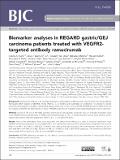| dc.contributor.author | Fuchs, Charles S | en_US |
| dc.contributor.author | Tabernero, Josep | en_US |
| dc.contributor.author | Tomášek, Jiří | en_US |
| dc.contributor.author | Chau, Ian | en_US |
| dc.contributor.author | Melichar, Bohuslav | en_US |
| dc.contributor.author | Safran, Howard | en_US |
| dc.contributor.author | Tehfe, Mustapha A | en_US |
| dc.contributor.author | Filip, Dumitru | en_US |
| dc.contributor.author | Topuzov, Eldar | en_US |
| dc.contributor.author | Schlittler, Luis | en_US |
| dc.contributor.author | Udrea, Anghel Adrian | en_US |
| dc.contributor.author | Campbell, William | en_US |
| dc.contributor.author | Brincat, Stephen | en_US |
| dc.contributor.author | Emig, Michael | en_US |
| dc.contributor.author | Melemed, Symantha A | en_US |
| dc.contributor.author | Hozak, Rebecca R | en_US |
| dc.contributor.author | Ferry, David | en_US |
| dc.contributor.author | Caldwell, C William | en_US |
| dc.contributor.author | Ajani, Jaffer A | en_US |
| dc.date.accessioned | 2016-11-18T20:46:45Z | |
| dc.date.issued | 2016 | en_US |
| dc.identifier.citation | Fuchs, C. S., J. Tabernero, J. Tomášek, I. Chau, B. Melichar, H. Safran, M. A. Tehfe, et al. 2016. “Biomarker analyses in REGARD gastric/GEJ carcinoma patients treated with VEGFR2-targeted antibody ramucirumab.” British Journal of Cancer 115 (8): 974-982. doi:10.1038/bjc.2016.293. http://dx.doi.org/10.1038/bjc.2016.293. | en |
| dc.identifier.issn | 0007-0920 | en |
| dc.identifier.uri | http://nrs.harvard.edu/urn-3:HUL.InstRepos:29408276 | |
| dc.description.abstract | Background: Angiogenesis inhibition is an important strategy for cancer treatment. Ramucirumab, a human IgG1 monoclonal antibody that targets VEGF receptor 2 (VEGFR2), inhibits VEGF-A, -C, -D binding and endothelial cell proliferation. To attempt to identify prognostic and predictive biomarkers, retrospective analyses were used to assess tumour (HER2, VEGFR2) and serum (VEGF-C and -D, and soluble (s) VEGFR1 and 3) biomarkers in phase 3 REGARD patients with metastatic gastric/gastroesophageal junction carcinoma. Methods: A total of 152 out of 355 (43%) patients randomised to ramucirumab or placebo had ⩾1 evaluable biomarker result using VEGFR2 immunohistochemistry or HER2, immunohistochemistry or FISH, of blinded baseline tumour tissue samples. Serum samples (32 patients, 9%) were assayed for VEGF-C and -D, and sVEGFR1 and 3. Results: None of the biomarkers tested were associated with ramucirumab efficacy at a level of statistical significance. High VEGFR2 endothelial expression was associated with a non-significant prognostic trend toward shorter progression-free survival (high vs low HR=1.65, 95% CI=0.84,3.23). Treatment with ramucirumab was associated with a trend toward improved survival in both high (HR=0.69, 95% CI=0.38, 1.22) and low (HR=0.73, 95% CI=0.42, 1.26) VEGFR2 subgroups. The benefit associated with ramucirumab did not appear to differ by tumoural HER2 expression. Conclusions: REGARD exploratory analyses did not identify a strong potentially predictive biomarker of ramucirumab efficacy; however, statistical power was limited. | en |
| dc.language.iso | en_US | en |
| dc.publisher | Nature Publishing Group | en |
| dc.relation.isversionof | doi:10.1038/bjc.2016.293 | en |
| dc.relation.hasversion | http://www.ncbi.nlm.nih.gov/pmc/articles/PMC5061911/pdf/ | en |
| dash.license | LAA | en_US |
| dc.subject | ramucirumab | en |
| dc.subject | gastric carcinoma | en |
| dc.subject | gastroesophageal carcinoma | en |
| dc.subject | biomarkers | en |
| dc.subject | VEGFR2 | en |
| dc.subject | antibody | en |
| dc.subject | angiogenesis | en |
| dc.subject | REGARD | en |
| dc.title | Biomarker analyses in REGARD gastric/GEJ carcinoma patients treated with VEGFR2-targeted antibody ramucirumab | en |
| dc.type | Journal Article | en_US |
| dc.description.version | Version of Record | en |
| dc.relation.journal | British Journal of Cancer | en |
| dash.depositing.author | Fuchs, Charles S | en_US |
| dc.date.available | 2016-11-18T20:46:45Z | |
| dc.identifier.doi | 10.1038/bjc.2016.293 | * |
| dash.authorsordered | false | |
| dash.contributor.affiliated | Fuchs, Charles | |


